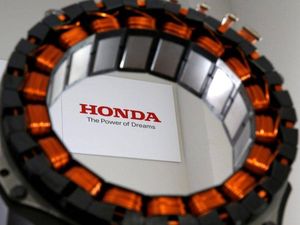



Date:14/07/16
 Japan's Honda Motor Co has co-developed the world's first hybrid car motor without using heavy rare earth metals, which it says will reduce its dependence on the expensive materials mainly supplied by China.
Japan's Honda Motor Co has co-developed the world's first hybrid car motor without using heavy rare earth metals, which it says will reduce its dependence on the expensive materials mainly supplied by China.
Hybrid vehicles combining a gasoline engine and electric motor have become increasingly popular in many developed countries, but sourcing a steady supply of rare earth elements such as dysprosium and terbium has been a challenge.
In 2010 China imposed a temporary ban on exports of rare earth minerals to Japan as the two nations engaged in territorial disputes.
Honda, Japan's third-largest automaker, said on Tuesday that its new motors used magnets developed by Daido Steel Co that do not contain dysprosium and terbium.
This reduced the cost of producing the magnets, a key component in motors, by about 10 percent while making them nearly 8 percent lighter, Honda said.
The new motors will be used in the next Freed minivan, which is sold in Japan and other Asian markets, to be unveiled in the autumn.
Honda started looking to reduce the use of heavy rare earth metals 10 years ago, but a spike in prices around 2011 prompted the tie-up with Daido, the company said.
"This technology will lower our costs and reduce our exposure to price fluctuations," a Honda official told reporters.
The redesigned motor still uses the light rare earth element neodymium, which is found in North America and Australia, as well as China.
Honda is aiming for new-energy vehicles, including gasoline-electric hybrids, plug-in hybrids, battery-electric and fuel cell vehicles to account for two thirds of its line-up by 2030, from around 5 percent now.
Honda co-develops first hybrid car motor free of heavy rare earth metals
 Japan's Honda Motor Co has co-developed the world's first hybrid car motor without using heavy rare earth metals, which it says will reduce its dependence on the expensive materials mainly supplied by China.
Japan's Honda Motor Co has co-developed the world's first hybrid car motor without using heavy rare earth metals, which it says will reduce its dependence on the expensive materials mainly supplied by China.Hybrid vehicles combining a gasoline engine and electric motor have become increasingly popular in many developed countries, but sourcing a steady supply of rare earth elements such as dysprosium and terbium has been a challenge.
In 2010 China imposed a temporary ban on exports of rare earth minerals to Japan as the two nations engaged in territorial disputes.
Honda, Japan's third-largest automaker, said on Tuesday that its new motors used magnets developed by Daido Steel Co that do not contain dysprosium and terbium.
This reduced the cost of producing the magnets, a key component in motors, by about 10 percent while making them nearly 8 percent lighter, Honda said.
The new motors will be used in the next Freed minivan, which is sold in Japan and other Asian markets, to be unveiled in the autumn.
Honda started looking to reduce the use of heavy rare earth metals 10 years ago, but a spike in prices around 2011 prompted the tie-up with Daido, the company said.
"This technology will lower our costs and reduce our exposure to price fluctuations," a Honda official told reporters.
The redesigned motor still uses the light rare earth element neodymium, which is found in North America and Australia, as well as China.
Honda is aiming for new-energy vehicles, including gasoline-electric hybrids, plug-in hybrids, battery-electric and fuel cell vehicles to account for two thirds of its line-up by 2030, from around 5 percent now.
Views: 537
©ictnews.az. All rights reserved.Similar news
- The mobile sector continues its lead
- Facebook counted 600 million active users
- Cell phone testing laboratory is planned to be built in Azerbaijan
- Tablets and riders outfitted quickly with 3G/4G modems
- The number of digital TV channels will double to 24 units
- Tax proposal in China gets massive online feedback
- Malaysia to implement biometric system at all entry points
- Korea to build Green Technology Centre
- Cisco Poised to Help China Keep an Eye on Its Citizens
- 3G speed in Azerbaijan is higher than in UK
- Government of Canada Announces Investment in Green Innovation for Canada
- Electric cars in Azerbaijan
- Dominican Republic Govt Issues Cashless Benefits
- Spain raises €1.65bn from spectrum auction
- Camden Council boosts mobile security





















